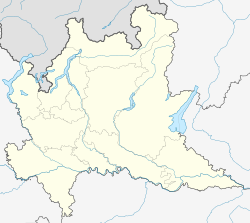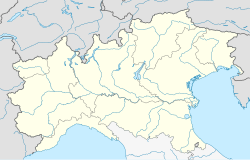 | |||||||||||
| General information | |||||||||||
| Location | Viale Monza, Gorla, Milan | ||||||||||
| Coordinates | 45°30′24″N9°13′22″E / 45.50667°N 9.22278°E | ||||||||||
| Owned by | Azienda Trasporti Milanesi | ||||||||||
| Platforms | 2 | ||||||||||
| Tracks | 2 | ||||||||||
| Construction | |||||||||||
| Structure type | Underground | ||||||||||
| Accessible | y | ||||||||||
| Other information | |||||||||||
| Fare zone | STIBM: Mi1 [1] | ||||||||||
| History | |||||||||||
| Opened | 1 November 1964 | ||||||||||
| Services | |||||||||||
| |||||||||||
| |||||||||||
Gorla is a station on Line 1 of the Milan Metro. It was opened on 1 November 1964 as part of the inaugural section of the Metro, between Sesto Marelli and Lotto. [2]
The station is located on Viale Monza, which is in the municipality of Milan. It serves the ward of Gorla. This is an underground station with two tracks in a single tunnel.



